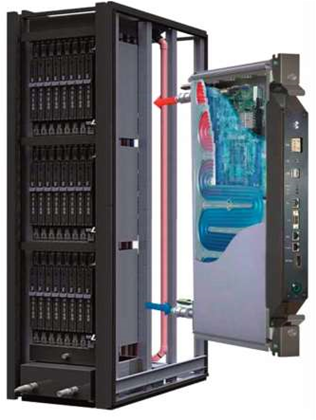A European Commision-funded consortium of 12 technology companies and research institutions is seeking to build an exascale supercomputer prototype this year, hoping to overcome the technical and architectural problems inherent with such systems by co-designing hardware and software.

The United States and China are already racing to build exascale high-performance supercomputers capable of at least one exa floating point operations per second (FLOPs), and able to process vast amounts of data quickly at a rate of one billion billion calculations per second.
However, exascale computing development has stalled mainly thanks to the large amount of power required for the systems - the ExaNeSt project said ten million processors working together are needed to reach exascale performance.
The ExaNeSt consortium believes that by using energy-efficient ARM cores that are liquid cooled and non-volatile flash memory that is integrated into the processors, it is possible to overcome the energy, cooling and packaging problems of exascale computing designs.
By working with European research and development partners such as ExaNoDe, which designs ARM-based microserver high-performance computers; EuroServer, which develops efficient processor communications technology; and hardware companies Ecoscale, Kaleao, Xilinx and Micron, ExaNeSt anticipates it will have a "straw man prototype" ready this year.
The initial prototype is designed to have over a thousand ARM cores.
These are provided through 64-bit four-core ARM Xilinx Zynq Ultrascale+ processor daughterboards with high-speed, 16 gigabit per second interconnects. Each core has 16 gigabytes of low power double data rate 4 memory.
Six daughterboards will be assembled into a liquid-cooled blade that has solid state storage and quad small form factor connectors capable of 3 x 56Gbps - the ExaNeSt prototype will feature multiple chassis with nine blades each.
A full prototype is expected to be ready by 2018, ExaNeSt said.
The FORTH Institute of Computer Science in Greece, University of Manchester of UK, Italy's National Institute of Astrophysics and Institute of Nuclear Physics along with the Fraunhofer Institute of Industrial Mathematics in Germany are collaborating on ExaNeSt.
The research institutitions are joined by liquid cooling specialist company Iceotope, development and performance analysis tool developer Allinea, and open source database consulting company MonetDB.


_(33).jpg&h=140&w=231&c=1&s=0)
_(20).jpg&h=140&w=231&c=1&s=0)
_(28).jpg&h=140&w=231&c=1&s=0)
.png&h=140&w=231&c=1&s=0)





 iTnews Executive Retreat - Security Leaders Edition
iTnews Executive Retreat - Security Leaders Edition
 iTnews Cloud Covered Breakfast Summit
iTnews Cloud Covered Breakfast Summit
 Melbourne Cloud & Datacenter Convention 2026
Melbourne Cloud & Datacenter Convention 2026
 The 2026 iAwards
The 2026 iAwards












_(1).jpg&h=140&w=231&c=1&s=0)



